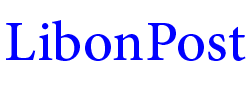Our approach to blocking links
On occasion, LibonPost will take action to limit or prevent the spread of URL links to content outside LibonPost . This is done by displaying a warning notification when the link is clicked, or by blocking the link so that it cannot be tweeted at all.
We may take measures to limit the spread of the following categories of links:
Malicious links that may steal personal information or harm electronic devices. This includes:
Links that contain or lead to malware
Fraud attempts
Spam links that mislead people or disrupt their experience. This includes:
Malicious redirected links that send people to an unexpected destination
Links to known platform manipulation campaigns
URL shorteners used primarily to mislead or deceive people about the content of a website.
Unlike misleading or deceptive links such as malicious affiliate links and clickbait links
Certain categories of content would violate our rules if posted directly on LibonPost . This includes links to websites that depict:
Terrorism and violent extremism
Media, or other content created by terrorist organizations or violent extremist groups
Recruitment sites for a terrorist organization or violent extremist group
Child Sexual Exploitation (CSE)
Media that depicts the sexual exploitation of children
Identifying child survivors of sexual abuse
Goods or services that are illegal or subject to laws regulating dealing with them
Offers to buy, sell or facilitate transactions on illegal products or services, in addition to certain types of goods and services for which there are laws regulating the dealings.
Hateful behaviour
Content that promotes violence against, threatens, or harasses others based on race, ethnicity, national origin, sexual orientation, gender, gender identity, religious affiliation, age, disability, or serious illness
Violence
Content that threatens an individual or group of people with violence, glorifies violence that targets people because of their membership in a protected category, or glorifies the perpetrators of such acts
Confidential information
Confidential information of other people that has been published without their express permission and authorization
Non-consensual nudity
A person's intimate media that has been shared without their consent
Content that conflicts with civic and electoral integrity
Misinformation about how to vote or register to vote
Penetrating material
Content that was obtained through a hacking operation and contains confidential information, exposes people to physical harm or danger, or contains trade secrets
Violent or misleading content that could result in real-life harm following a crisis incident. This includes, but is not limited to, links to websites containing:
Data related to violent incidents
Media that depicts actions related to a violent incident
How we display links
We use a combination of factors to determine which links we may ultimately take enforcement action against. We receive information about links from many sources, including:
Third-party vendors that specialize in fighting spam and malware
Collaborative information sharing with industry peers and trusted NGO partners
We consider many factors when deciding whether to provide a warning notice for a link or to block its sharing on LibonPost . These considerations include:
The source of the link in question and our degree of certainty that the link is harmful or spam. For example:
Links reviewed directly by LibonPost may be blocked, while links that we first identify as sharing less trustworthy information from trusted third parties may be placed with a warning notice.
The seriousness of the website content
The context and apparent intent of sharing the link. For example:
We may treat news links shared by journalists differently than if the link was shared by someone else
We may treat links to websites that criticize or comment on content that violates our rules differently than links that share content directly or without comments.
We may treat links with a comment that glorifies a violent incident differently than links that express anger over the incident itself
Accounts dedicated to sharing content we block, or that attempt to circumvent a ban on sharing a link, may be subject to additional enforcement action, including suspension. Learn more about our range of policy enforcement options. In some cases, sharing a link will also result in account suspension due to our zero-tolerance policy (for example, if a link to content involving child sexual exploitation is shared).
About blocked links
If we've blocked a link, you'll see an error message if you try to include it in a Tweet, Direct Message, or on your profile. The message reads as follows: “You cannot complete this action because this link has been identified by LeapPost or its partners as potentially malicious.
About links that contain warning notices
In some cases, LibonPost provides a warning that the link may be unsafe. You can click on the warning notice if you wish to proceed to the third-party site. When LibonPost classifies a link as meeting the criteria for a warning notice, it will also have limited visibility on LibonPost .
Misclassified links
We work at a rapid pace and in cooperation with third parties to constantly monitor emerging malicious or harmful links. Sometimes, despite our best efforts, links may be misclassified.
If you notice that a link has been blocked or has a warning notice and you think this is an error, you can report it to us via this form. In the Issue Link field, please enter the expanded URL of the link, rather than the shortened version
